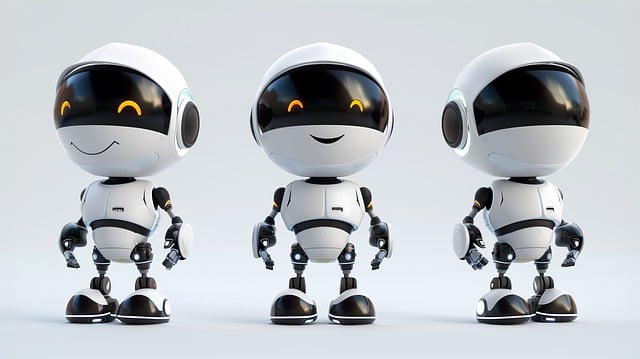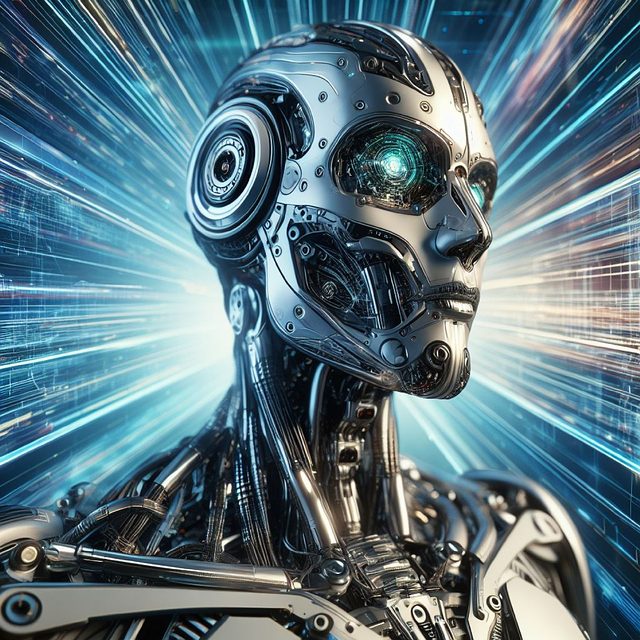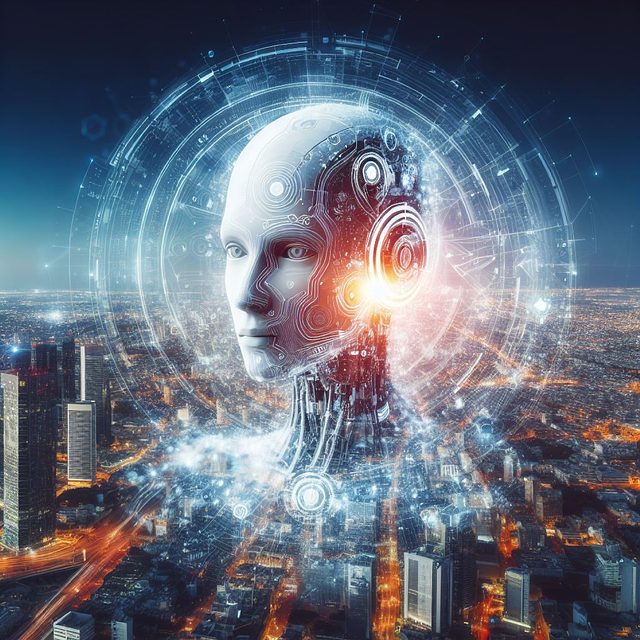Chatbot AI technologies have transformed digital interactions by integrating advanced machine learning and natural language processing capabilities, enabling sophisticated conversational agents that simulate human-like dialogue. These systems are adept at handling a wide range of tasks across sectors such as customer service, e-commerce, healthcare, and more, providing efficient solutions for frequently asked questions, appointment bookings, and personalized recommendations. As they learn from interactions, chatbots become increasingly proficient at managing complex conversations with improving accuracy. The future of chatbot AI is poised to deepen user experiences and enhance business operations across industries, offering a blend of personalized interaction and AI efficiency.
Over the past decades, chatbot AI has evolved significantly, transitioning from rule-based scripts to sophisticated conversational agents powered by neural networks and deep learning. Today's chatbots offer advanced natural language processing capabilities, allowing for more contextually relevant and nuanced human-like text interactions. They are equipped to learn from each user interaction, adapt their responses accordingly, and even exhibit a degree of personality, all while maintaining a focus on data privacy and cybersecurity. The trajectory of chatbot AI underscores its profound impact on conversational interfaces, promising continued innovation and application across various sectors.
Chatbot AI systems are now integral to customer engagement and operational efficiency, offering immediate and accurate responses in customer service, providing health information in healthcare, delivering personalized financial guidance in finance, individualized learning experiences in education, and streamlining processes in real estate. As these technologies advance, they present both opportunities and challenges, including ethical considerations regarding data privacy, employment impacts, and the potential for biases within AI systems. Addressing these issues with ethical guidelines and regulatory frameworks is crucial to ensure that chatbot AI continues to provide benefits while minimizing risks and aligning with societal values.
2023 heralds an era where chatbot AI online redefines digital communication. This article delves into the multifaceted world of chatbot AI systems, exploring their origins, capabilities, and applications across industries. From basic scripted responses to sophisticated conversational agents, we’ll trace the evolution of these technologies. Key features and functionalities that define modern chatbot AI will be highlighted, offering a comprehensive understanding. Moreover, real-world case studies showcase the transformative power of chatbot AI in enhancing user experiences and streamlining operations. As we project into the future, we consider the potential innovations, challenges, and ethical implications shaping the trajectory of chatbot AI. Join us on this journey to uncover the intricacies and impact of chatbot AI online.
- Understanding AI Chatbots: A Primer on Chatbot AI Technologies
- The Evolution of Chatbot AI: From Simple Scripts to Advanced Conversational Agents
- Key Features and Capabilities of Chatbot AI Systems
- Real-World Applications of Chatbot AI in Various Industries
- The Future of Chatbot AI: Innovations, Challenges, and Ethical Considerations
Understanding AI Chatbots: A Primer on Chatbot AI Technologies

Chatbot AI technologies represent a significant advancement in the realm of artificial intelligence, transforming digital interactions through machine learning and natural language processing. These intelligent systems are designed to simulate conversation with human users, enabling businesses and service providers to automate responses to common queries and deliver instant support at scale. At their core, chatbot AI utilizes pre-defined scripts for routine tasks, but their sophistication lies in the ability to learn from interactions over time, refining their responses to better mimic natural human dialogue. This continuous improvement is facilitated by algorithms that analyze patterns in communication and user behavior, allowing chatbots to handle increasingly complex conversations with greater accuracy.
The integration of chatbot AI technologies in various sectors, including customer service, e-commerce, and healthcare, has been instrumental in enhancing efficiency and customer satisfaction. These systems are not only capable of handling a multitude of tasks such as answering FAQs, booking appointments, and providing recommendations but also have the potential to be fine-tuned for specific industries, ensuring relevance and effectiveness in their applications. As chatbot AI continues to evolve, it is poised to become even more integrated into our daily lives, offering a seamless blend of human-like interaction with the scale and efficiency of artificial intelligence.
The Evolution of Chatbot AI: From Simple Scripts to Advanced Conversational Agents

The landscape of conversational interfaces has undergone a remarkable transformation over the past decades, with chatbot AI evolving from rudimentary script-based systems to sophisticated conversational agents. Initially, these early chatbots were little more than rule-based programs, capable of handling predefined queries and responses through a set of hardcoded instructions. These simple scripts allowed users to navigate basic menus or respond to specific commands, marking the genesis of what would become a highly interactive and dynamic field within AI.
As computational power increased and machine learning algorithms advanced, chatbot AI began to harness natural language processing (NLP) technologies. This shift enabled chatbots to interpret and generate human-like text with greater accuracy and nuance. The integration of neural networks and deep learning techniques further propelled the evolution of chatbot AI. Today’s conversational agents are equipped with advanced NLP capabilities, enabling them to engage in more natural and contextually relevant conversations with users. They can learn from interactions, adapt their responses over time, and even exhibit a degree of personality or character, making each interaction more seamless and human-like. This progression not only enhances user experience but also opens up new possibilities for businesses and organizations looking to leverage chatbot AI for customer service, personal assistance, and beyond.
Key Features and Capabilities of Chatbot AI Systems

Chatbot AI systems represent a significant advancement in artificial intelligence, designed to simulate conversation with human users through text or voice interactions. These sophisticated digital entities are equipped with natural language processing capabilities, enabling them to understand and interpret human language with remarkable accuracy. The integration of machine learning algorithms allows these chatbots to learn from each interaction, continuously improving their responses and personalizing the user experience over time. Advanced chatbot AI systems utilize deep learning techniques to handle complex queries, ensuring a high degree of accuracy in their responses across various domains. They can be programmed to handle multiple tasks, such as customer service support, booking, and even providing educational content, making them indispensable tools for businesses aiming to enhance user engagement and streamline operations. The design of these systems also incorporates security measures to protect sensitive data exchanged during conversations, ensuring user privacy and confidence in the technology. As chatbot AI continues to evolve, their capabilities expand, offering more natural and efficient communication channels that can adapt to a wide range of applications, from simple FAQs to complex problem-solving tasks.
Real-World Applications of Chatbot AI in Various Industries

Chatbot AI has become an integral part of various industries, leveraging natural language processing to facilitate interactions between humans and machines. In customer service, chatbots are deployed to handle inquiries, providing instant responses to common questions, thereby reducing wait times and improving overall efficiency. These AI-driven systems can manage a high volume of interactions simultaneously, ensuring that customer needs are addressed promptly and accurately. The healthcare sector also benefits from chatbot AI, where these bots assist patients by answering health-related queries, guiding them through symptom checkers, or reminding them to take their medication. In the realm of finance, chatbots offer personalized financial advice, help with transactions, and provide real-time support for account management, enhancing customer experience while freeing human agents to tackle more complex tasks.
Furthermore, in the educational field, chatbot AI serves as a tutor or learning companion, offering students personalized learning experiences through conversational interfaces. These systems can adapt to different learning styles and provide explanations tailored to individual needs. In the retail industry, chatbots are employed to enhance the shopping experience by providing product recommendations, answering questions about inventory, and processing orders. Additionally, in the real estate sector, AI chatbots assist potential buyers or renters with their queries, offering information on property listings, scheduling viewings, and even helping with the paperwork involved in the transaction process. Across these varied applications, chatbot AI demonstrates its versatility and capability to streamline operations, personalize experiences, and provide valuable support across numerous industries.
The Future of Chatbot AI: Innovations, Challenges, and Ethical Considerations

Chatbot AI continues to evolve at a rapid pace, with innovations shaping their capabilities and interactions. The integration of natural language processing with machine learning algorithms has led to more sophisticated conversational agents that can understand and respond to human language with greater accuracy and context awareness. As these systems become more adept at mimicking human-like responses, they are being deployed across various sectors including customer service, healthcare, education, and entertainment. The future promises even more advanced interactions where chatbots not only handle routine inquiries but also possess the ability to engage in complex problem-solving and offer personalized recommendations, potentially altering how businesses operate and how individuals access information and services.
However, with these advancements come significant challenges and ethical considerations. The development of chatbot AI necessitates careful consideration of data privacy, as these systems often handle sensitive user information. Ensuring the security of this data against breaches is paramount. Additionally, as chatbots become more integrated into daily life, questions arise about their impact on employment, particularly in customer service roles, and how they can complement human skills rather than replace them. Ethical concerns also surround the potential for AI to perpetuate biases if not carefully monitored and designed. The challenge lies in creating ethical guidelines and frameworks that govern the design, deployment, and evolution of chatbot AI to ensure they are aligned with societal values and serve the greater good.
chatbot ai has undeniably reshaped online interactions, offering a seamless blend of automation and personalized engagement. From their inception as rudimentary scripts to today’s sophisticated conversational agents, chatbots have traversed a remarkable evolution, carving out a significant niche across various industries. As we look ahead, the potential for chatbot ai continues to expand, promising even more intuitive and capable systems that can handle complex tasks with finesse. However, as these technologies advance, it is imperative to address the attendant challenges and ethical considerations to ensure their integration aligns with societal values and benefits. The landscape of online experiences will be forever transformed by chatbot ai, with its capabilities set to redefine user interaction and streamline operations across the globe.
